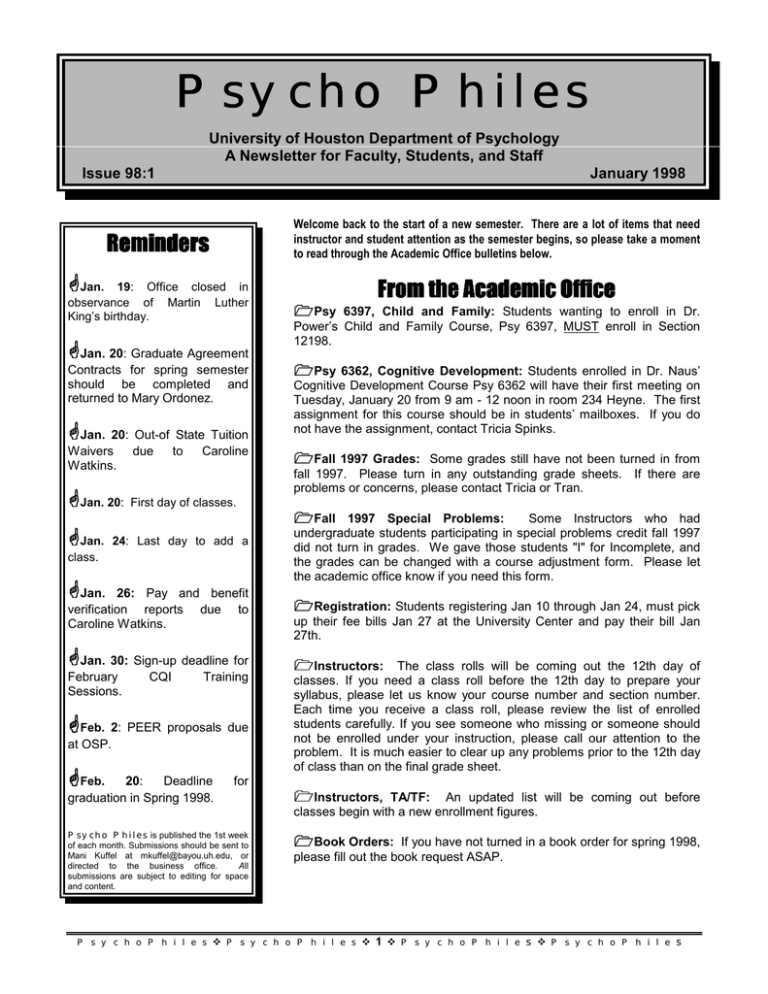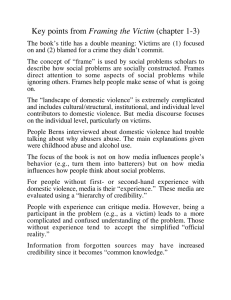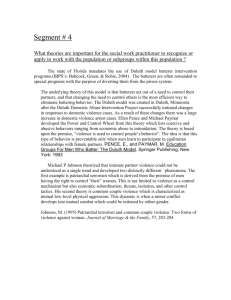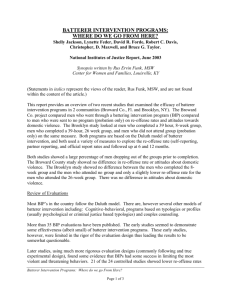Psycho Philes
advertisement

Psycho Philes University of Houston Department of Psychology A Newsletter for Faculty, Students, and Staff Issue 98:1 January 1998 Reminders Welcome back to the start of a new semester. There are a lot of items that need instructor and student attention as the semester begins, so please take a moment to read through the Academic Office bulletins below. 19: Office closed in observance of Martin Luther King’s birthday. Psy 6397, Child and Family: Students wanting to enroll in Dr. Jan. Jan. 20: Graduate Agreement Contracts for spring semester should be completed and returned to Mary Ordonez. Jan. 20: Out-of State Tuition Waivers due to Caroline Watkins. Jan. 20: First day of classes. Jan. 24: Last day to add a class. Jan. 26: Pay and benefit verification reports due to Caroline Watkins. Jan. 30: Sign-up deadline for February CQI Training Sessions. Feb. 2: PEER proposals due at OSP. Feb. 20: Deadline graduation in Spring 1998. for Psycho Philes is published the 1st week of each month. Submissions should be sent to Mani Kuffel at mkuffel@bayou.uh.edu, or directed to the business office. All submissions are subject to editing for space and content. From the Academic Office Power’s Child and Family Course, Psy 6397, MUST enroll in Section 12198. Psy 6362, Cognitive Development: Students enrolled in Dr. Naus’ Cognitive Development Course Psy 6362 will have their first meeting on Tuesday, January 20 from 9 am - 12 noon in room 234 Heyne. The first assignment for this course should be in students’ mailboxes. If you do not have the assignment, contact Tricia Spinks. Fall 1997 Grades: Some grades still have not been turned in from fall 1997. Please turn in any outstanding grade sheets. If there are problems or concerns, please contact Tricia or Tran. Fall 1997 Special Problems: Some Instructors who had undergraduate students participating in special problems credit fall 1997 did not turn in grades. We gave those students "I" for Incomplete, and the grades can be changed with a course adjustment form. Please let the academic office know if you need this form. Registration: Students registering Jan 10 through Jan 24, must pick up their fee bills Jan 27 at the University Center and pay their bill Jan 27th. Instructors: The class rolls will be coming out the 12th day of classes. If you need a class roll before the 12th day to prepare your syllabus, please let us know your course number and section number. Each time you receive a class roll, please review the list of enrolled students carefully. If you see someone who missing or someone should not be enrolled under your instruction, please call our attention to the problem. It is much easier to clear up any problems prior to the 12th day of class than on the final grade sheet. Instructors, TA/TF: An updated list will be coming out before classes begin with a new enrollment figures. Book Orders: If you have not turned in a book order for spring 1998, please fill out the book request ASAP. P s y c h o P h i l e s P s y c h o P h i l e s 1 P s y c h o P h i l e s P s y c h o P h i l e s Desk Copies: Instructor and TAs who need day of arrival at the airport. 2) Passengers must check -in a the airport a minimum of 20 minutes prior to departure for domestic flights and a minimum of 40 minutes prior to departure for international flights. All seats will be released if travelers have not checked in by these times. Airline reductions in commissions to travel agencies has resulted in travel agencies charging fees for some services. Any fee charged by the travel agency for trip cancellations, or changes as required for business or personal emergencies may be reimbursed with the appropriate written documentation. desk copies, please come by the office to fill out the desk copy request form. Special Problems Credit: Both graduate and undergraduate students wishing to enroll in special problems credit for spring 1998 must fill out a general petition. This petition must state exactly what research project is involved and a psychology faculty member must sign the form. Instructors: Please remember that the academic office has videos for course use available in the resource room. Videos are available for viewing in the office and a check out procedure has been developed. Every instructor must leave his/her name, phone number, e-mail, and office number to check out the videos with the front desk. All videos and VCR/TV are kept in a locked cabinet. Please let Tricia know on a good turn around policy for checked out videos. SOS CQI Training, Spring 1998 The College of Social Sciences will offer spring sessions of Continuous Quality Improvement training each Wednesday in February. Sessions will be held in room 110 Heyne Building. Feb. 4. 8:30 - 10:30 CQI Tools: process mapping, benchmarking and others. Feb. 11 8:30 - 12:00 Effective Communication: communication styles, ways of providing feedback, handling conflicts. Feb. 18 8:30 - 10:30 Systems Thinking: root cause analysis. Feb. 25 8:30 - 10:30 Project Team Development. The training is presented by Stephanie Foy of the UH Center for Organization Research and Effectiveness. Registration for Thesis/Dissertation Hours: We have changed the set up of the Thesis and Dissertation hours registration for Spring, 1998. Each student trying to enroll for these hours must consult the list in the academic office. Students will register by finding his/her committee chair section number and call VIP with that section number. If your chair is missing on the list, please let us know. This process will help the office with the return time on completed Thesis and Dissertation final grades, because the committee chair will get a grade sheet with his/her appropriate students. Who’s Who National Recognition The University of Houston has been selected to nominate 99 juniors, seniors, and graduate students for the Who’s Who Among Students in American Universities and Colleges. Selection is based upon the student’s academic achievement, service to the University and community, participation and leadership in extracurricular activities and potential for future success. Application forms are available from Caroline Watkins. Completed forms should be returned to the Department of Campus Activities in the University Center Underground #51 no later than February 6, 1998. News and Notes UH VITA Site for 1998 The University of Houston has been approved as a 1998 Volunteers in Tax Assistant (VITA) site. The VITA program provides foreign national students and faculty assistance in preparing their U.S. tax returns (Forms 1040 NR or 1040 NR EZ). The VITA program consists of volunteers from the Houston Chapter of CPAs and the local community who have been trained by the IRS in preparing nonresident alien tax returns. The location of the help site is the nd University Center in the Bluebonnet Room on the 2 floor. The help site will be open 10:00 am to 2 pm March 7,14,21,28, and April 4 and 11. Statistics Jokes Which statistic is the most biased? Answer: The partial How do you measure someone's selfassurance? Answer: Do a confidence interval Travel Updates The FAA plans to issue rules requiring random selection of domestic travelers for positive bag match. As a result: 1) A number of airlines have decided to eliminate all advanced boarding passes. Advanced seat assignments will continue to be available, but boarding passes will not be issued until P s y c h o P h i l e s P s y c h o P h i l e s What’s New In Research TESTING THE EFFICACY OF BATTERERS’ INTERVENTIONS: A Grant Proposal Submitted to the National Institute of Justice by Julia C. Babcock, Ph.D. 2 P s y c h o P h i l e s P s y c h o P h i l e s may account for the differences in recidivism rates between completers, noncompleters, and incarcerated batterers. Only a randomized clinical trial can determine the effectiveness of domestic violence interventions. In Phase II of our research, we intend to conduct such an experiment to provide conclusive evidence as to the efficacy of Seattle’s DV treatment programs. The goal of this project is to evaluate the efficacy of probation and two types of court-mandated batterers treatment programs. Our ultimate objective is to inform judges as to the best course of action in sentencing domestic violence offenders. Probation officers or judges will randomly assign 300 batterers to 1) a cognitive-behavioral group batterers treatment program plus probation, 2) a Duluth-model group treatment program plus probation, or 3) a probation-only control group. Batterers will complete questionnaires and a clinical interview prior to beginning treatment or probation. The batterers and their partners will be contacted to report on levels of physical and emotional abuse one and two years following the initial arrest. Criminal records of domestic violence incident reports, arrests, and convictions will be reviewed to assess pre- and post-treatment criminal history. Hopefully, we will not only be able to answer the question “Does batterers’ treatment work?” but also begin to answer Gordon Paul’s (1969) ultimate clinical question: “What treatment is most effective for which type of individual, and under which set of circumstances?” Different types of batterers may be more responsive to different types of treatment. Eventually, treatments may be tailored to meet the needs of each subtype of violent men, which is likely to improve treatment efficacy and reduce the incidence of further domestic assaults. References • Babcock, J.C. & Steiner, R. (1997). The effects of treatment and incarceration on recidivism of battering: A longitudinal study of Seattle’s coordinated community response to domestic violence. Manuscript submitted for publication. • Gondolf, E.W. (1988a). The effect of batterer counseling on shelter outcome. Journal of Interpersonal Violence, 3, 275-289. • Paul, G.L. (1969). Behavior modification research: Design and tactics. In C.M. Franks (Ed.), Behavior therapy: Appraisal and status. (p. 44). New York: McGraw-Hill. Despite the growing awareness of the problem of domestic violence, we know little about how to effectively treat it. Research on domestic violence has lagged the development of legal and clinical interventions. Washington State in particular has been on the cutting edge of implementation of mandatory arrest policies and innovative interventions to domestic violence. Judges have been court-mandating batterers into year-long treatment with little empirical evidence that such treatment is effective. Although not yet published, one large randomized clinical trial found that the treatment for batterers was not effective in reducing further crimes. Batterers who attended the men’s or couples’ group had no fewer reoffenses than those who had no additional services (F.W. Dunford, personal communication). Then there is controversy in the field as to whether treatment for batterers should even be offered. Gondolf (1988) found that whether a batterer has sought counseling is the most influential predictor of whether his wife will return to him after leaving a shelter. In light of the lack of evidence for the efficacy of marital violence treatment programs, perhaps that the very existence of batterers’ treatment actually increases the wife’s risk by leading to a false sense of security if her husband has sought treatment. However, we have preliminary evidence that treatment for batterers as it exists in Seattle is effective in reducing recidivism over two years (Babcock & Steiner, 1997). We followed 387 batterers who were court-mandated to attend a Seattle-area batterers treatment program for two years. Batterers who completed group DV treatment were compared to those who dropped out of treatment and to those who were incarcerated in lieu of treatment. We found evidence that completing batterers’ treatment was related to a reduction in domestic violence police involvement during a follow-up 2 years following the initial incident. About 5% of the treatment completers committed another DV reoffense at Time 2, as compared to 24% of the non-completers and 62% of the incarcerated batterers. That is, batterers who were court-ordered into treatment but who did not complete it were more likely to commit further domestic violence related offenses than treatment completers. This result remained significant even after controlling for the effects due to prior criminal history or demographics. The number of DV group treatment sessions correlated negatively with DV arrests at follow-up. Thus, DV treatment was found to contribute to a significant reduction in DV recidivism that cannot be explained away as artifacts of the pre-existing group differences in criminality and socioeconomic status. This Phase I project (Babcock & Steiner, 1997) was a quasi-experimental evaluation of an existing DV coordinated community intervention program, not a true experiment like a randomized clinical trial. As such, we can make no conclusive claims that the DV intervention caused or lead to a reduction in domestic violence. Although in this study we attempted to statistically control for the effects of between-group demographic and criminality differences, other pre-existing betweengroup factors, such as differences in psychopathology, P s y c h o P h i l e s P s y c h o P h i l e s PUBLICATIONS, WORKSHOPS PRESENTATIONS, & Dement, D. F., Perry, S. M., Nash, S. G., Evans, R. I. (1998). Stability of Self-Esteem In Adolescent Drug Use. Paper accepted for presentation at forthcoming Society of Behavioral Medicine 19th Scientific Sessions, March 25-28, 1998, New Orleans, LA. Perry, S. M., Nash, S. G., Evans, R. I. (1998) Differences Among Adolescent Abstainers, 3 P s y c h o P h i l e s P s y c h o P h i l e s Experimenters, and Frequent Alcohol Users. Paper accepted for presentation at forthcoming Society of Behavioral Medicine 19th Scientific Sessions, March 25-28, 1998, New Orleans, LA. Photiades, J. R., Lewis, H. L. (1998). Incorporating Affect Into Social-Cognitive Models of HIV Prevention. Paper accepted for presentation at forthcoming Society of Behavioral Medicine 19th Scientific Sessions, March 25-28, 1998, New Orleans, LA. Spiller, L. C., Ware, H. S., McDonald, R., & Jouriles, E. N. (1997). Maternal distress as a mediator of the relation between exposure to wife abuse and child internalizing problems. Paper presented at the Association for Advancement of Behavior Therapy, Miami, Florida, Nov. 1997. Velasquez, M.M. Motivational Enhancement and Harm Reduction in Substance Abuse. Invited presentation at the Virginia Association of Public Health Community Services Board, Substance Abuse Council. Virginia Beach, VA., October 9, 1997 Velasquez, M.M. Stages of Change: Facilitating Positive Behavior Change in Your Patients. Invited presentation at the University of South Carolina Medical School’s Fifth Annual Alcohol and Drug Issues Conference for Clinicians, Columbia, SC. December 6, 1997 Velasquez, M.M. Moving through the Stages of Change: Practical Techniques for Using Stages of Change and Motivational Interviewing Research in your Practice. Invited workshop presented at the University of South Carolina Medical School’s Fifth Annual Alcohol and Drug Issues Conference for Clinicians, Columbia, SC. December 6, 1997. Ware, H. S., McDonald, R., Spiller, L. C., & Jouriles, E. N. (1997). The stability of externalizing problems exhibited by children of battered women. Paper presented at the Association for Advancement of Behavior Therapy, Miami, Florida, Nov. 1997. EJIOGU, KINGSLEY C., Development And Test Of A Behavioral Model Of Job Commitment. HASTINGS, PHILIP A., A Comparison Of Utility Estimation Procedures Applied To A System For FAA Safety Inspections. HENTGES, BETH A., The Reminiscence Bump: The Distribution And Characteristics Of Autobiographical Memories. McCAULEY, STEPHEN R., Relation Between The Disability Rating Scale And Affective/Neurobehavioral Changes Following Closed-Head Injury: A Growth Curve Analysis. ROMERO, ANDREA J., The Impact Of Ethnic Identity On Sociopsychological Stress And Mental well-being In Adolescents From A Rural Setting. ZAN, BETTY S., Friendship And Interpersonal Understanding In Young Girls. MASTERS ADAMS, KIMBERLY A., The Effect Of The Rating Process On Construct Validity: Reexamination Of The Exercise Effect In Assessment Center Ratings. ADDY, ROBERT C., Modeling Decisional Balance In Three Behavior Domains. DELAUNE, KATHERINE A., Depression And Decisional Balance In An Alcoholic Population. LEBLANC, TINA M., Stability Of The Myers-Briggs Type Indicator Across Standard And Work Specific Instructions. LEWIS, HOLLY, Uncovering The ErotophobicErotophilic Component In The Attitude Toward Condoms Scale. NENE, DIPTI, Religiosity, Peer Pressure, And Risky Sexual Behavior Among Adolescents. REXER, JENNIE, Global-Local Processing In Unilateral Brain Tumor Patients. TURK, MICHAEL R., Leader-Member Exchange: An Examination Of The Multidimensionality Of LMX And Confirmatory Factor Analysis Of A New Measure. Thanks to All Who Gave The Texas Multi-Ethnic Sibling Study would like to thank all of the faculty and students who donated money and gifts to our project so that we could help a needy family during the holiday season. Due to your generosity, we were able to provide our “adopted” family with clothes, food, space heaters and Christmas gifts. We delivered everything before Christmas and I can tell you that all of the items were greatly appreciated---the smile on the 5 year old’s face as he clutched his new teddy bear really said it all. Thanks again for your generosity! Fall 1997 Graduates Congratulations to the following fall 1997 graduates. DOCTORATE P s y c h o P h i l e s P s y c h o P h i l e s 4 P s y c h o P h i l e s P s y c h o P h i l e s



